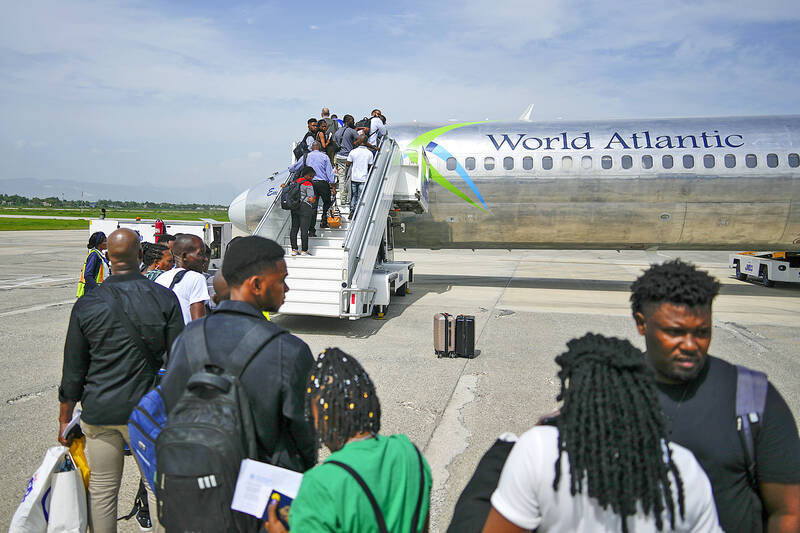Haiti’s main international airport on Monday reopened for the first time in nearly three months after relentless gang violence forced authorities to close it.
The reopening of Toussaint Louverture International Airport in the capital, Port-au-Prince, is expected to help ease a critical shortage of medications and other basic supplies, as the country’s main seaport remains paralyzed and gangs control 80 percent of the capital.
Airlines based in the US are not expected to start using the airport until late this month or next month.

Photo: AP
The first commercial passenger flight since March left for Miami nearly two hours behind schedule, with sweating passengers complaining about the lack of air-conditioning until takeoff.
Although the flight was organized by local carrier Sunrise Airways, it contracted Florida-based charter airline World Atlantic, which distributed paper towels to drenched passengers.
As the plane hurtled down the runway and took off, one passenger said in a soft voice: “Yes. Yes.”
Before Monday, the sole airport operating in Haiti was in the north coastal city of Cap-Haitien. It was out of reach for many seeking to flee the country, with roads leading from Port-au-Prince controlled by gangs that have opened fire on vehicles passing through.
The US government had evacuated hundreds of citizens by helicopter out of a hilly neighborhood in Port-au-Prince, as did nonprofit organizations, as gangs laid siege to parts of the capital.
The attacks began on Feb. 29, with gunmen seizing control of police stations, opening fire on the Port-au-Prince airport and storming Haiti’s two biggest prisons, freeing more than 4,000 inmates.
Gangs have since directed their attacks on previously peaceful communities, leaving thousands homeless.
More than 2,500 people were killed or injured in Haiti from January to March, a more than 50 percent increase compared with the same period last year, the UN has said.
At the Couronne Bar near the sole airport gate operating on Monday, 43-year-old manager Klav-Dja Raphael welcomed her first clients, but her smile belied her fear.
“We are scared because they can still attack us here,” she said. “We must come in. It’s our job, but we’re afraid.”
Other workers, including those at immigration, were all smiles, content to be finally back at work.
“That was a long vacation,” one immigration agent said.
Dozens of people lined up hours before the flight.
“I’m very happy, but it hurts that I’m leaving my husband and my son,” said Darling Antoine as her eyes began to water.
She received a visa allowing her to live in the US, but the rest of her family is still waiting. They applied because gangs kept encroaching on their neighborhood.
“There are heavy gunshots every day,” she said. “Sometimes we have to hide under the bed.”
Jean Doovenskey, a 31-year-old accountant, left unemployed by the violence, said he was notified early last month that he was authorized to live in the US.
He plans to live with his aunt in Florida, but hopes to return to Haiti one day.
“I believe in a new Haiti,” he said.

Kehinde Sanni spends his days smoothing out dents and repainting scratched bumpers in a modest autobody shop in Lagos. He has never left Nigeria, yet he speaks glowingly of Burkina Faso military leader Ibrahim Traore. “Nigeria needs someone like Ibrahim Traore of Burkina Faso. He is doing well for his country,” Sanni said. His admiration is shaped by a steady stream of viral videos, memes and social media posts — many misleading or outright false — portraying Traore as a fearless reformer who defied Western powers and reclaimed his country’s dignity. The Burkinabe strongman swept into power following a coup in September 2022

‘FRAGMENTING’: British politics have for a long time been dominated by the Labor Party and the Tories, but polls suggest that Reform now poses a significant challenge Hard-right upstarts Reform UK snatched a parliamentary seat from British Prime Minister Keir Starmer’s Labor Party yesterday in local elections that dealt a blow to the UK’s two establishment parties. Reform, led by anti-immigrant firebrand Nigel Farage, won the by-election in Runcorn and Helsby in northwest England by just six votes, as it picked up gains in other localities, including one mayoralty. The group’s strong showing continues momentum it built up at last year’s general election and appears to confirm a trend that the UK is entering an era of multi-party politics. “For the movement, for the party it’s a very, very big

ENTERTAINMENT: Rio officials have a history of organizing massive concerts on Copacabana Beach, with Madonna’s show drawing about 1.6 million fans last year Lady Gaga on Saturday night gave a free concert in front of 2 million fans who poured onto Copacabana Beach in Rio de Janeiro for the biggest show of her career. “Tonight, we’re making history... Thank you for making history with me,” Lady Gaga told a screaming crowd. The Mother Monster, as she is known, started the show at about 10:10pm local time with her 2011 song Bloody Mary. Cries of joy rose from the tightly packed fans who sang and danced shoulder-to-shoulder on the vast stretch of sand. Concert organizers said 2.1 million people attended the show. Lady Gaga

SUPPORT: The Australian prime minister promised to back Kyiv against Russia’s invasion, saying: ‘That’s my government’s position. It was yesterday. It still is’ Left-leaning Australian Prime Minister Anthony Albanese yesterday basked in his landslide election win, promising a “disciplined, orderly” government to confront cost-of-living pain and tariff turmoil. People clapped as the 62-year-old and his fiancee, Jodie Haydon, who visited his old inner Sydney haunt, Cafe Italia, surrounded by a crowd of jostling photographers and journalists. Albanese’s Labor Party is on course to win at least 83 seats in the 150-member parliament, partial results showed. Opposition leader Peter Dutton’s conservative Liberal-National coalition had just 38 seats, and other parties 12. Another 17 seats were still in doubt. “We will be a disciplined, orderly